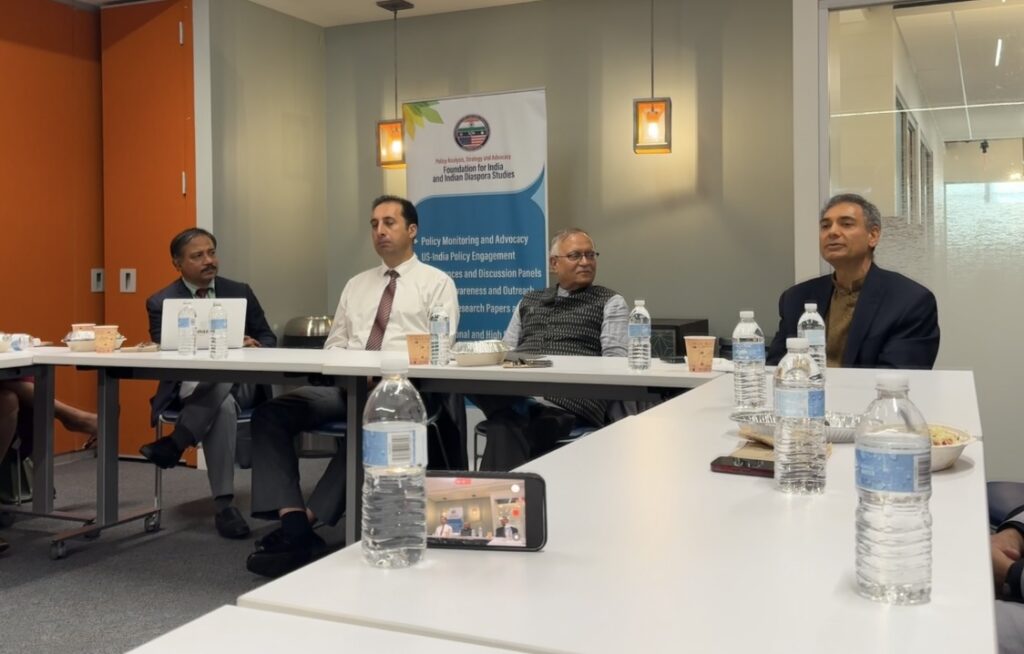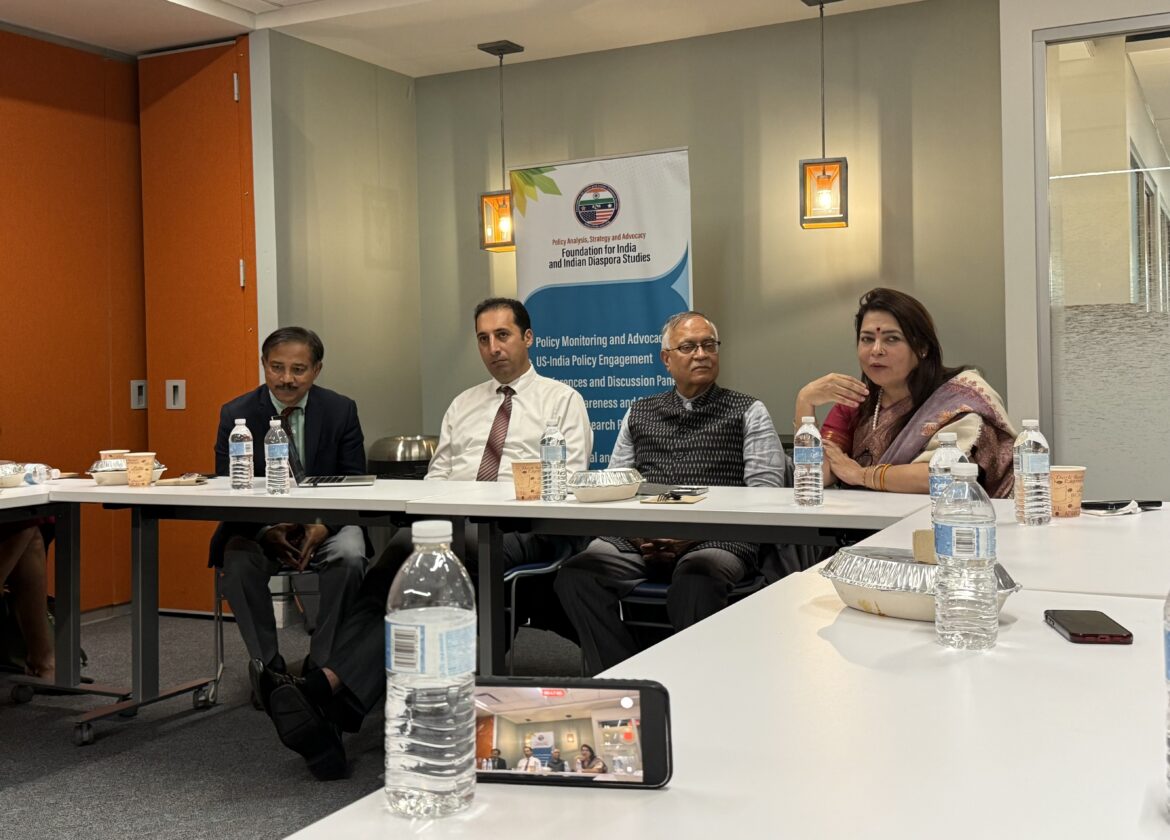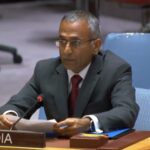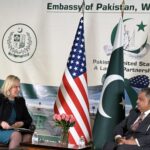In a compelling address underscoring the role of innovation and shared democratic values in shaping the global order, former Minister of State for External Affairs of India, Meenakshi Lekhi said that science and technology is the “way forward” for a strong US-India partnership.
“As an Ambassador of Indian values, Indian culture, and peaceful coexistence between the United States and India, I feel science and technology is the way forward for the two countries to unite. Because we value education, knowledge, technology, and scientific contribution of our societies,” said Lekhi while participating as a special guest at a roundtable on the Afghanistan and Pakistan region hosted by the Foundation for India and Indian Diaspora Studies (FIIDS) on November 3, 2025, in Washington DC.
The event, moderated by FIIDS President Khanderao Kand, brought together regional experts and policymakers including Hashim Wahdatyar, Author and Analyst at the Institute of World Affairs; Senge Sering, Founder of the Institute of Gilgit Baltistan Studies; Capt. Alok Bansal of the India Foundation; Ambassador Pradeep Kapur, former Indian envoy to Cambodia; and Srujan Palkar, Assistant Director at the Scowcroft Middle East Security Initiative, Atlantic Council.
The former Minister emphasized that shared respect for education and innovation can serve as a cornerstone for closer cooperation between India and the United States. “If these are the binding principles, we have a lot to collaborate and work on,” she said, highlighting the potential for joint efforts in technology-driven education and women’s empowerment, particularly in conflict zones like Afghanistan.
She described Afghan citizens as “peaceful people,” affirming her strong support for women’s education and rights in Afghanistan. Till the universities and schools are open for women in the country, “Indian brains” can use technology to teach them all at home, she added, suggesting India could leverage its digital expertise to reach Afghan women despite Taliban-imposed restrictions.
Linking National Security and Social Progress
Reflecting on her formative years, Lekhi recounted being asked why India needed to be a strong nation. “Strength in terms of securing any civilization comes from having an insight into geographical protection of that region within which the culture can exist,” she said. “Social security comes from the national security,” she added, stressing that without national security, challenges to human values will always persist.

Drawing a contrast between the Afghanistan she knew in the 1980s and the one today, Lekhi recalled having an Afghan friend, a woman, pursuing a Master’s in Zoology at Delhi University. “So that is the Afghanistan I am aware of,” she said. “By nature, I think Afghanis and Indians, and for that matter, that entire region, we are pretty much alike.” Speaking from a “feminine perspective,” she added that “women are as much human as men,” and share the same aspirations.
Lekhi also warned against forces that thrive on disruption, cautioning “Their purpose is to create chaos, and their purpose is to create negativity.”
Afghanistan’s Challenges and Regional Dynamics
Responding to Lekhi’s remarks, Hashim Wahdatyar praised her message of peace. “I love what you just said,” he told her, agreeing that Afghanistan’s future must not be defined by confrontation. “If the Taliban does not open schools and universities immediately, that does not mean that we go to war with them,” he said.
Wahdatyar noted that during the past 20 years, “every single Afghan was behind supporting the Afghan girls and women to go for work and to pursue education.” However, since the Taliban’s return to power, girls’ education beyond the sixth grade has been banned across Afghanistan.
“We would go technology, peaceful way,” Wahdatyar emphasized, adding that “we should not pursue Pakistan narrative in Afghanistan.” He reaffirmed that India remains one of Afghanistan’s most trusted partners: “Go and talk to 44 million people; you will not find one person say something against India. We are so proud of it. India has always supported Afghanistan.”
He also dispelled rumors that the Taliban had restricted digital access, clarifying that “Internet is working” across the country.
India’s Role in Advocating for Women’s Rights
Ambassador Pradeep Kapur referred to earlier formal, informal, and closed-door discussions between the Indian and Afghan governments, emphasizing that India must now take an even firmer stance on women’s rights – not only in education but in their broader emancipation.
“That agenda item has to be very high on our discussions with the Taliban, in spite of their ideologies and outlook against women,” he stressed, adding that the emancipation of women in the Islamic world should be a top priority for India. Once women’s emancipation is achieved, he said, the potential for a brighter future in many other countries facing similar challenges would be immense.
He noted that India has long supported Afghanistan’s people and nation, but now the country must engage in some “hard bargaining” behind closed doors with the Taliban to push for policy change. “If they go down the path, they are ruining the future of their country. They are ruining the future of their children,” he added.
Pakistan-Taliban Relations and Emerging Fault Lines
Senge Sering presented a detailed analysis of the deteriorating relations between Pakistan and the Taliban, particularly over the issue of the Tehrik-i-Taliban Pakistan (TTP). Both groups, he said, adhere to the same religious and political ideology, and “are indispensable to each other for effective sanctuary, logistical support and cadre recruitment.”
Sering alleged that Pakistan’s military has benefited financially from drug smuggling along the Durand Line, now disrupted by ongoing border clashes. He said that while the U.S. perceives Pakistan’s weakening influence over Kabul as creating an opportunity for ISIS to regroup, some elements within Pakistan’s military may actually encourage ISIS as a counterweight to the Taliban.
He further claimed that “President Trump would like to regain control over Bagram base,” noting that “TTA believes that the international community should recognize its regime to counter growing ISIS threat. Lack of recognition undermines Taliban’s sense of victory and sovereignty and benefits the ISIS.”
Sering also discussed China’s geopolitical interests, asserting that Beijing desires stability in Afghanistan to protect its investments. “China wants the Taliban to be part of CPEC,” he said, referring to the China-Pakistan Economic Corridor. Any Taliban backlash, he warned, could destabilize Xinjiang and embolden Baloch insurgents targeting Chinese infrastructure.
He cautioned that the emerging Trump–Munir understanding—a reference to former U.S. President Donald Trump and Pakistan Army Chief Gen. Asim Munir—could pose “challenges for U.S. internal security,” as Munir’s long-term ambitions “involve employing Islamism and boosting China.”
“Ideological Beast”: The Taliban’s Enduring Rigidity
Capt. Alok Bansal of the India Foundation described the Taliban as an “ideological beast,” noting that they have “never compromised with their ideology.” He argued that Pakistan has long viewed the Taliban as a useful proxy, expecting them to secure Islamabad’s interests in Kabul.
“Of all the actors of Afghan political landscape, the only actor which could do their bidding somewhat was the Taliban,” Bansal said, recalling former Pakistani Prime Minister Nawaz Sharif’s view that there cannot be peace in Afghanistan until the Taliban has a stake in governance.
He observed that the Taliban’s territorial control has fueled “a resurgence of radical forces like TTP.” While he refrained from calling Afghanistan a “safe haven” for the group, Bansal acknowledged “a certain amount of convergence in the ideology.”
Given these dynamics, he concluded, “I don’t visualize a lasting peace between Afghanistan and Pakistan.”
The Disconnect Within Pakistan
Srujan Palkar focused on the generational divide within Pakistan. He noted a growing “disconnect between what the youth of Pakistan envisions Pakistan to be versus what the leadership envisions.”
He observed that during several international forums, Pakistani officials tend to “talk more about India than about Pakistan.” In contrast, he said, “The Pakistani youth want employment opportunities and a good future,” which has led to a massive economic exodus from the country.






